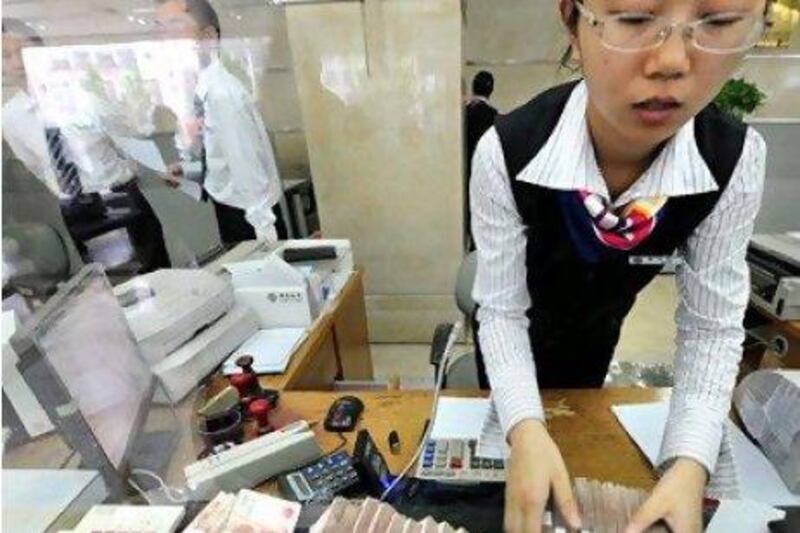A new threat is emerging to global economies, and from the most unexpected of quarters: the Chinese financial system.
Some economists and financial experts believe Beijing is sitting on an unexploded bomb, in the form of a much higher level of non-performing loans held by its giant banking institutions.
"It could threaten the global recovery, which is already weakened by the euro crisis and America's sluggish recovery," said one economist based in Dubai, who asked to remain anonymous because of the sensitivity of the issue. "And it could hit the Middle East hard at the worst possible time, as the effects of the Arab Spring highlight the region's problems."
Moody's Investors Service, the international ratings agency, recently estimated there could be a US$541 billion (Dh1.98 trillion) "black hole" in the banking system, largely because of hitherto undisclosed non-performing loans to local governments from the country's big banks.
"The potential scale of problem loans at Chinese banks may be closer to our stress case than to our base case. This is clearly a negative trend for creditors," said Moody's, in its deadpan fashion.
Problem loans at Chinese banks could be as much as 12 per cent of total lending, Moody's said, compared with the current 1.1 per cent.
The problem has arisen in a sector familiar to Europeans and Americans: local government. Many western economies, from Germany to California, have found that state and regional authorities were living beyond their means for years before the financial crisis.
You could argue that the "local government" of Greece has triggered the crisis in the euro zone with its profligacy and is now being bailed out by the "central government" economy of Germany.
But such profligacy is not usually associated with the Chinese. The country is generally reckoned to be a thrifty, hard-saving economy that eschews the use of credit and prefers to keep hard cash in the banks.
Up to a point, that is true. The most significant global financial trend of recent years has been the use of Chinese savings by western, mainly US, consumers to fuel their bonanza of spending, especially on property.
Chinese financial strength is generally believed to be the single most important factor in pulling the country quickly out of recession in 2009, which in turn led the global economy back from the brink of an international economic crash.
But there was another factor at play: the Chinese government committed itself to a multibillion-dollar spending spree on infrastructure, which certainly boosted the economy but also led to the situation Moody's has identified.
Infrastructure projects - roads, bridges, utilities plants and the like - are approved by the central government, but administered by local authorities, which are not generally reckoned to be the most efficient at financial control.
"There is a lot of financial 'leakage' in all infrastructure work, but in the Chinese regions there is the added problem of corruption," said the Dubai economist. "A place like Sichuan is very much like Greece in this respect."
International investors are becoming more aware of the issue. Last week Temasek, the giant Singapore sovereign wealth fund that likes to boast it has a better track record than the US super-capitalist Warren Buffett, sold down stakes in Bank of China and China Construction Bank, two of China's biggest financial institutions.
It was no fire sale, and the Singaporeans took a healthy profit, but many in the market read the move as "calling the top" of the Chinese financial sector.
Add this to rising concerns about the Chinese property market, which has been "bubbling" for the past year, and doubts that the country can sustain its prodigious rates of economic growth amid worrying signs of destabilising inflation, and suddenly the world's most dynamic economy looks vulnerable. That would present problems for the global economy, which has relied on continuing high levels of Chinese demand to pull it out of the post-financial crisis doldrums.
But it would also be a significant threat to the Middle East, for two main reasons.
Chinese demand for oil is one of the reasons crude prices have remained so high over the past year, but there has been a sharp decline lately. The consultancy Capital Economics said recently second-quarter imports of industrial commodities into China were at their lowest level since the bad days of 2009.
The second reason that China's concerns would affect the Gulf region is the sheer weight of the growing commerce between the two economies.
At the Abu Dhabi and China Economic Forum in Shanghai last month, ministers and businessmen heard that UAE trade with China would exceed $100bn by 2015, challenging the "top trade partner" status of the US and the EU.
"The Chinese have been very good at entering markets in the Middle East and Africa, mainly in the construction sector, in infrastructure, roads, building and so on," said one banker.
The continuing vitality of that Gulf-China trade highway depends ultimately on the health of the Chinese financial and economic system. That is at risk if Sichuan turns out to be the new Greece.





